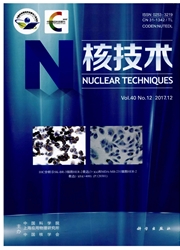

 中文摘要:
中文摘要:
利用兰州重离子加速器提供的25MeV·u^-1^86Kr^26+离子辐照厚度为12μm和25μm的聚对苯二甲酸乙二酯(Poly(ethylene terephthalate),PET)薄膜,注量分别为1×10^6ions·cm^-2和5×10^7ions·cm^-2.将辐照后的PET薄膜浸入5mol·L^-1、60℃的NaOH溶液蚀刻,制得不同孔径的核孔膜样品。分析了测厚法、光学显微镜观察法和泡点法三种孔径测量法的优劣,实验对比结果表明,对于孔径小于1μm的纳米孔径核孔膜,适合利用泡点分析法测量有效截留孔径,测量误差小于5%;对于孔径大于3μm的微米孔径或直筒孔核孔膜,优先选择光学显微镜观察法测量表面孔径,测量误差小于10%。制备孔径为2μm和450nm的核孔膜样品,用其进行黄河水过滤,探究过滤效果。进一步证明微米孔径核孔膜去除水样中一般颗粒物有明显效果(微粒数目平均减少99.12%),450nm孔径或更小孔径的核孔膜可绝大部分清除水样中的细菌(微粒数目减少99.90%)。实验结果对今后核孔膜孔径的测量和定标及水质净化具有参考意义。
 英文摘要:
英文摘要:
Background: It is well known that nuclear track membranes (NTMs) were widely used in medicine, environment and other fields. But there is no standard pore size measurement method currently. For some specific fields of application like water treatment, filtration performance of NTMs with various pore size has seldom reported. Purpose: This paper aims to investigate pore size measurement method for NTMs and evaluate the filtration performance of NTMs with various pore size. Methods: Three measurement methods i.e. measuring of the thickness, observing by optical microscope and analyzing by pore size analyzer (bubble point method), were presented and compared, NTMs with pore sizes of 2 μm and 450 nm were used in this filtration experiments. The filtration performance was also evaluated. Results and Conclusion: Experimental results show that pore size analyzer is suitable for pore size less than 1 μm, with an error ratio less than 5%, whilst the optical microscope is suitable for pore of cylindrical-shape or large size (more than 3 μm) with an error ratio less than 8%. NTMs with pore size of 2 μm can reduce the chromaticity and turbidity by an average of 99.12% (particle counter). NTMs with pore size of 450 nm or less can effectively separate bacteria by an average of 99.90% (particle counter) in water.
 同期刊论文项目
同期刊论文项目
 同项目期刊论文
同项目期刊论文
 期刊信息
期刊信息
